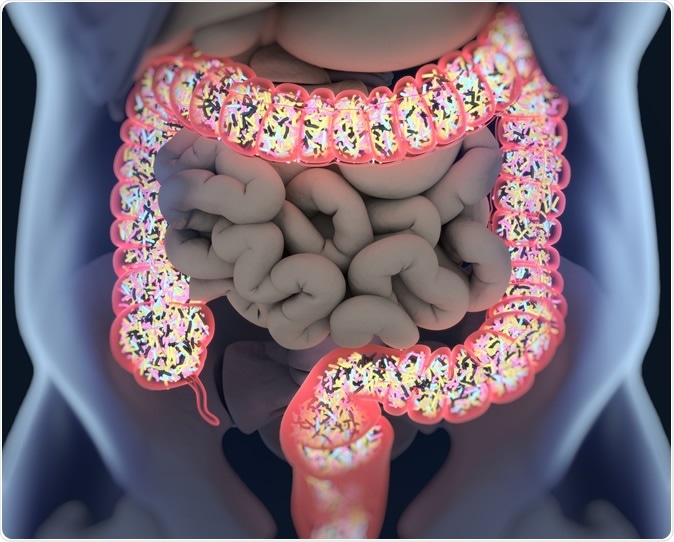Children with increased genetic risk of type 1 diabetes have different gut microbiomes than those with low risk, a new study found.
A team of researchers at the Linköping University in Sweden and the University of Florida in the United States found that the genetic risk for developing type 1 diabetes autoimmunity is associated with distinct changes in the gut microbiome.

Gut bacteria, microbiome. Bacteria inside the large intestine, concept, representation. 3D illustration. Credit: Anatomy Insider / Shutterstock
The susceptibility to various autoimmune diseases is usually caused by strong genetic control by class II human leukocyte antigen (HLA) allele combinations. These genes are usually considered the greatest risk factors in the development of autoimmune diseases, like celiac disease and type 1 diabetes. But little information is known about HLA and how it influences the human gut microbiome composition.
The study, which was published in the journal Nature Communications, suggests that genetic risk can help shape a person’s response to environmental factors in the development and progression of certain autoimmune diseases.
In type 1 diabetes, which is considered a serious autoimmune disease that appears during childhood or adolescence, both genetic and environmental factors play crucial roles in the development of the disease. Once the disease kicks in, lifelong treatment with insulin is required.
But hereditary factors are not enough to cause the disease. Environmental factors play pivotal roles in developing the disease. For instance, the gut microbiome or flora and its role in the maturation of the immune system have been studied over the past years. In line with this, the researchers think the body’s flora may influence the development of the illness.
Connections between genetic predisposition for disease and gut flora
To arrive at their findings, the researchers used the ABIS (All Babies in Southeast Sweden) study. The ABIS study aims to determine the reason why children develop immune-related conditions, particularly type 1 diabetes.
The study spans an estimated 17,000 children born from 1997 to 1999, who were followed with questionnaires and biological samples since they were born. The follow-up tests were done when the kids were 1, 3, 5, 8 years old, and above. The researchers enrolled 403 children to study the link between genetic predisposition for disease and the gut microbiome. The team analyzed the children for genetic risk based on genetic variation in HLA genes.
The HLA genes play imperative roles in the immune system, and some of its variants are the greatest genetic risk factors for type 1 diabetes. Meanwhile, the researchers analyzed the gut microbiome in the children in stool samples collected when they were one-year-old.
"Certain bacterial species were not found at all in children with high genetic risk but were found in those with low or no risk,” Johnny Ludvigsson, senior consultant at HRH Crown Princess Victoria Children's Hospital, Linköping University Hospital and senior professor in the Department of Clinical and Experimental Medicine, Linköping University, said in a statement.
“This is very interesting, as this could mean that certain species have protective effects and may be useful in future treatment to prevent autoimmune diseases. It may be that certain species cannot survive in individuals with high genetic risk,", he added.
In past studies, researchers focused on the gut flora concerning the development of type 1 diabetes, which was grounded on children who have high genetic risks for the disease. The present study, however, is the first one to check the relationship of genetics and the gut microbiome in a general population, including those with low, neutral, and high genetic risk.
The researchers believe that further research is important to get a better understanding of how genetics and the gut microbiome affect the development of type 1 diabetes. This way, new treatments can help in the monitoring and treatment of the disease, and other autoimmune diseases such as rheumatoid arthritis and celiac disease.
Journal reference:
Genetic risk for autoimmunity is associated with distinct changes in the human gut microbiome
Jordan T. Russell, Luiz F. W. Roesch, Malin Ördberg, Jorma Ilonen, Mark A. Atkinson, Desmond A. Schatz, Eric W. Triplett & Johnny Ludvigsson, Nature Communications volume 10, Article number: 3621 (2019), https://www.nature.com/articles/s41467-019-11460-x